Memory Care
Don't have time to read this now? Download a PDF version instead.
Memory Care in Georgia
As America’s senior population grows, we shouldn’t be surprised to learn that the number of older adults with dementia is also increasing. In fact, according to the Alzheimer’s Association, 10% of those 65 or older suffer from Alzheimer’s. That’s 5.8 million people in 2020, a number predicted to grow to 13.8 million by 2050. In Georgia, there were 130,000 diagnosed Alzheimer’s patients in 2014, with that number expected to increase by 46.2% by 2025.
Clearly, the need for long-term housing that can provide assisted living and/or memory care is significant, and rising.
We’re all “forgetful” at times. We can’t find our keys. Or remember a certain word. Or recall someone’s name. That’s all perfectly normal. But dementia is not normal, it’s a disease – several somewhat different diseases, actually. Alzheimer’s is the best-known and most common, but there are other types of dementia. The one thing they have in common is that they erode memory and cognitive ability.
Dementia is a heart-breaking diagnosis that can be as worrisome and discomfiting for families as it is for patients themselves. No one wants to see an aging loved one’s health deteriorate, but to see them losing their mental acuity feels so much harder. We can’t see the problem, but we can surely see the results. We feel helpless.
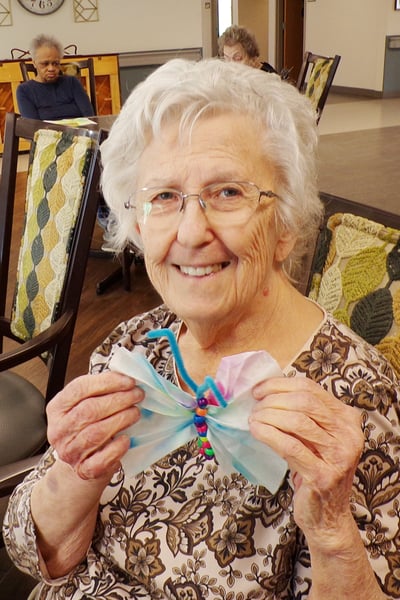 Not Your Grandpa’s Nursing Home
Not Your Grandpa’s Nursing Home
Memory care has come such a long way! In the past, the only options were at-home care or, eventually, moving Grandpa to a stark, sterile nursing home where he could at least get medical care while his mind continued to fade away. Today, thanks to intense study, medical scientists and psychologists are now able to clearly identify key symptoms of dementia, along with triggers that exacerbate these symptoms and approaches to care that can help avoid those triggers.
Modern memory care is proactive, with specially-designed surroundings and personalized care programming that aims to enhance each resident’s quality of life based on their specific mental and physical health needs. Most memory care units are associated with assisted living or skilled nursing communities, but there are also stand-alone memory care facilities. All are governed by state regulations, and the range and quality of care varies from one facility to another.
The State of Georgia defines “memory care unit” as “the specialized unit of an assisted living community or personal care home that either presents itself as providing memory care services or provides personal services in secured surroundings to persons with diagnoses of probable Alzheimer’s disease or other dementia.”
Memory care units provide the same types of personal help assisted living residents receive, but meals are always included and units are built to help residents remain safe (a large percentage of dementia patients tend to wander) and feel calm. Staff includes nurses and aides who are specifically trained to understand and work with dementia patients.
Magnolia Manor is a non-profit, faith-based organization that provides all types of senior living and care to residents of all faiths. Each of our eight campuses throughout South Georgia is distinctively different in setting and range of services offered; yet all reflect our dedication to delivering personalized, quality care in a family-like atmosphere. We offer memory care at three of our communities -- Americus, Buena Vista, and Columbus. One way not to feel helpless is to learn as much as you can about memory care options. That way, you can plan ahead and feel more confident about making the right choices for your beloved senior. In this guide, we’ll help you do that. We’ll explore what modern memory care is all about, what it’s like to live in a memory-focused setting, what it costs, and how to choose a community that will bring positives into your Mom or Dad’s daily living experience.
 Understanding your options will bring you some peace during this difficult time for your family. That peace of mind will help you be a better caregiver now, and it will comfort you later on when the time comes for your loved one to move to a professional memory care community. Because we live by our faith here at Magnolia Manor, we have faith that you will make the right, most loving decision. But we also know you’ll have lots of questions. We are always available to talk.
Understanding your options will bring you some peace during this difficult time for your family. That peace of mind will help you be a better caregiver now, and it will comfort you later on when the time comes for your loved one to move to a professional memory care community. Because we live by our faith here at Magnolia Manor, we have faith that you will make the right, most loving decision. But we also know you’ll have lots of questions. We are always available to talk.
Knowing When It’s Time for Professional Memory Care
Many adult children who notice their parent(s) start to decline take them into their own homes. Elders get the extra help they need and enjoy maximum contact with family, while you can keep a closer eye on their condition to discuss with their doctor.
Unfortunately, almost inevitably, Mom or Dad will need more care than you can give them, even if you get help from visiting nurses or personal care aides. You, or professionals trained to care for memory patients, can help your loved one with activities of daily living such as bathing, dressing, eating and getting around as well as administering medications and other medical care tasks, and just being there so you can take a break.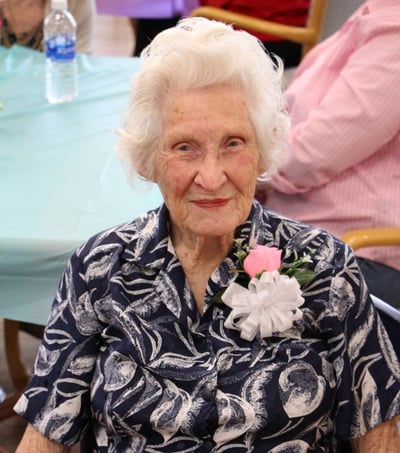
However, dementia patients have greater needs, and these can be much more taxing for care-givers. Their mind doesn’t recall information or assemble it in an organized way. They aren’t only forgetful, they may have trouble performing everyday tasks, thinking things through, or properly using language skills to communicate. They may have difficulty accurately recognizing spatial relationships. They can become irritable and irrational.
As their dementia progresses, it becomes more and more difficult to care for your loved one at home, even if their health is pretty good otherwise. It is time-consuming and draining, and it can be downright scary if your Mom or Dad tends to wander. How can you provide a reliably secure space for them around the clock? How can you handle aggressive outbursts or other especially difficult behaviors? The truth is, you can’t. You love them with all your heart, but you aren’t trained for this.
You don’t want to believe that your Mom or Dad would be better off living somewhere other than with you – after all, you are family! But this is a reality you will likely have to face at some point. If you don’t, no one benefits.
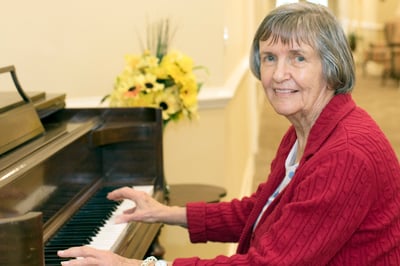 So how do you know when it’s time for a change? Ask yourself:.
So how do you know when it’s time for a change? Ask yourself:.
- Has your loved one been formally diagnosed with Alzheimer’s or another form of dementia? This is required for memory care unit residents. The staff works closely with individual medical providers to devise and monitor personal care plans for each resident. Is Mom or Dad capable of responding quickly and appropriately in the event of an emergency (calling 911, etc.)?
- Is their ability to handle activities of daily living deteriorating?
- Are they acting “strangely” – for example, exhibiting fear of other people, becoming suspicious of certain foods or their medications?
- Have they gotten lost while out shopping or taking a walk? Or wandered away from home? If so, did they know who they were and how to get back home?
- Do they no longer recognize people they should know? Do they confuse them with someone else, maybe even persons who perhaps died many decades ago?
- Does the confusion seem worse at night? Are you worried about sleeping too soundly if they wandered away?
- Have their physical health challenges increased to the point where skilled nursing is necessary?
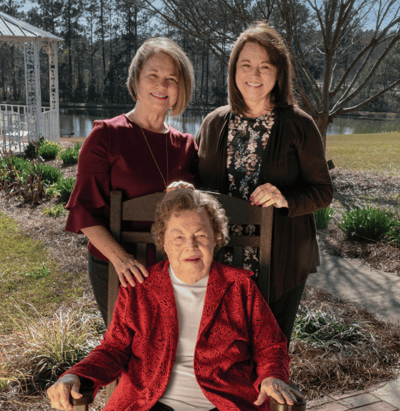 And what about you? Is your own quality of life suffering?
And what about you? Is your own quality of life suffering?
- When was the last time you spent meaningful time with your spouse, kids, or friends?
- When did you last have time to yourself, for peace and quiet or to do something just for you?
- Is your own health deteriorating?
- Are you missing too much work?
- Are you getting any help, from family or friends, or from home health care assistance providers? (Can you even afford increasing paid assistance?)
- When was the last time you had a nice, comforting chat with your pastor or someone else you care about?
If you are exhausted, mentally and physically, you cannot be the loving caregiver you want to be.
Tough as it may be for you to admit, professional memory care makes more sense, but discussing the situation with Mom or Dad may be equally difficult. Our team here at Magnolia Manor recommends you start the conversation from a point of positivity:
- Summon your faith to pray about the situation and seek guidance.
- Choose a time to talk when you feel as relaxed as possible, because your calm demeanor will help soothe your loved one.
- Share what you’ve learned about the benefits of professional memory care and available options that will appeal most to Mom or Dad. Get their input.
- Know that, in all likelihood, you’ll need to have multiple conversations in order to work your way toward acceptance. Don’t rush things. Take it slowly and allow time for your loved one to process. Don’t be surprised if they become agitated or angry. Working it out together, as much as possible, will make the transition a bit easier for everyone.
The right memory care community will really care about your Mom or Dad. They will do what they can to keep your loved one’s body and spirit strong and their mind appropriately occupied in positive ways.
Types of Memory Care Facilities
Because caring for residents with dementia is complex and highly specialized, you might think that these facilities are all the same. Not true! There are several types of memory care communities, and they can vary significantly when it comes to services and amenities offered as well as their physical design.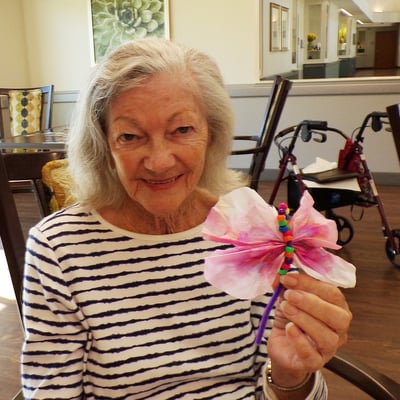
Continuing Care Retirement Communities (CCRCs)
If your loved one is considering assisted living and has little to no memory loss at this time, a Continuing Care Retirement Community may be an option. As the name implies, these facilities provide a full spectrum of care for seniors as needed, from independent living all the way through to end-of-life care. As medical or memory needs change, residents often move to a more appropriate unit, but always within the same community. To pay for this comprehensive care, CCRCs require a hefty buy-in fee as well as charging for monthly expenses. Magnolia Manor is not a CCRC, so our entry fees are modest--if they exist at all.
Personal Care Homes
These are facilities that function as smaller-scale assisted living group homes, housing fewer than 25 adult residents. In Georgia, Personal Care Homes may offer memory care services if they meet requirements for security, staffing, etc.
Assisted Living
Many assisted living communities around the country incorporate memory care units or wings. This enables residents to move into assisted living accommodations while they are still largely independent and have mild or no signs of memory or cognitive dysfunction. They can take full advantage of the wealth of amenities and activities available to assisted living residents. Then, if and when memory challenges become more advanced, the resident can simply transition to the other area without leaving the community that now feels like home to them.
This continuity can provide added peace of mind for both residents and their families, since it eliminates the disruption of having to search anew for a memory care community. Our Magnolia Manor campuses at Americus and Columbus offer both personal care and memory care, as well as skilled nursing and rehabilitative services. Our award-winning Marion County campus in Buena Vista includes units for memory care, skilled nursing and rehabilitation.
.jpg?width=285&height=190&name=Mattie%20H.%20Marshall%20Hawaiian%20Luau%20(2065).jpg) Independent Memory Care Facility
Independent Memory Care Facility
You will also find residential care facilities dedicated entirely to caring for patients with dementia.
Skilled Nursing
These facilities, sometimes still referred to as nursing homes, provide 24-hour care for residents with significant medical health problems. However, because many of these patients also suffer from some form of dementia, skilled nursing communities often include a separate memory care floor or wing. In some cases, care may be primarily custodial with a focus on managing symptoms and limited activities or amenities for resident stimulation.
Typical Services
Generally speaking, you can expect a memory care community to provide:
- Round-the-clock supervised care, including medical monitoring and assistance with activities of daily living (eating, bathing, dressing, etc.) as needed
- Staff who have been specially trained to assist individuals with cognitive and memory deficits, whether mild, moderate or severe
- All meals, with staff personally ensuring residents take part
- Pleasant, soothing surroundings physically designed for easy navigation
- Private or semi-private rooms
High quality memory care communities also offer a wide range of structured programming designed to slow disease progression and reduce symptoms such as depression, wandering, anger, and sundowning (a symptom in which the person becomes more confused or agitated later in the day). Scheduled activities aim to provide soothing structure without anxiety-inducing over-stimulation. The ultimate goal is to give residents in all stages of dementia the highest quality of life.%20(low%20rez).jpg?width=285&height=190&name=Mattie%20H.%20Marshall%20-%20Easter%20Cookie%20Decorations%20(9724)%20(low%20rez).jpg)
Some communities also offer psychiatric or psychology services to assist in managing dementia patients who are aggressive. This can be especially helpful in finding the proper medication dosage for patients.
Security is paramount at every memory care facility, to protect residents who may be inclined to wander or deliberately seek exits. Some communities lock ingress and egress points and use code-access elevators, and even disguise them within the unit so exits are harder to find. Some facilities have fully enclosed gardens or courtyards, so residents can safely spend time exercising and enjoying fresh air and sunshine. Some communities outfit residents (or their wheelchairs or walkers) with personal alert devices that notify staff when someone is getting too close to an exit or an elevator.
Debunking Myths about Memory Care
Myths abound about senior living of all types. Some of these misconceptions are based on things that may have been true in the past, but most are just plain wrong. This is one more reason it’s so important to learn the facts and to check out first-hand the specific facilities you may be considering for your loved one. One myth you definitely want to ignore: all memory care communities are the same. The truth? Not at all!
Some other common myths you may have heard about living in a memory care facility:
Your Mom or Dad will languish. Many adult children fear that moving their parent into a memory care facility will signal the end of nurturing, one-on-one stimulation. You worry that their mind will deteriorate faster, and their physical health will decline, too.
As with assisted living for seniors who have no memory problems at all, memory care is about helping each resident live life to the fullest. The more we can help and encourage dementia patients to do for themselves (safely and under supervision if needed), the more we may be able to slow progression of their disease.
It’s impersonal. Levels of care and approaches to care vary from one community to another, so some are very basic and others are more comprehensive and more personalized. Staff at quality communities go out of their way to learn about each resident as a person because knowing their family, background, likes and dislikes makes it easier to engage with them as individuals. At Magnolia Manor, we treat residents like family because, to us, they are.
We offer a variety of activities designed specifically for patients with mild, moderate and severe dementia – activities that appeal to many interests as well as capabilities, to strengthen the body and spirit as well as the mind, in the way that works best for each resident. We work closely with your loved one’s doctor to devise a care plan.
So, What Is It Really Like to Live in a Memory Care Community?
It’s one thing to realize as you get older that you can’t do everything for yourself like you used to. But it’s quite something else to realize that your mind is weakening. You’re forgetting more things, more often. You feel puzzled. As dementia progresses, patients start to see and relate to their world differently. Specific symptoms can differ depending on the type of dementia, but surroundings in a memory care unit are designed visually and functionally to minimize confusion and anxiety.
Communities usually feature as much natural light as possible and adjustable lighting that mimics natural light, low-contrast flooring and décor, all of which help reduce anxiety and aggression. They are also designed with rounded or circular hallways instead of sharp corners or dead-ends and room identification signage that includes both words or numbers and pictures. These traits reduce confusion as well as anxiety.
Modern memory care takes each patient where they are in their dementia progression and works to make the most of the abilities they still have. The best communities are dignified and homey and active in ways that work smoothly for dementia sufferers. Because every dementia patient is different and the range of services and amenities can vary considerably from one memory care community to another, there is no such thing as a “typical” day for residents.
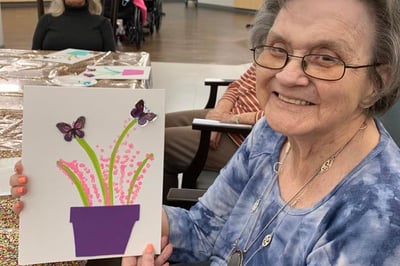 Alzheimer’s and related research has shown that people with cognitive deficits can benefit greatly from activities such as art, assembling puzzles, gardening, music, dancing, and light exercise programs, to the extent they are physically able. So some memory care communities now incorporate these into their activities schedule.
Alzheimer’s and related research has shown that people with cognitive deficits can benefit greatly from activities such as art, assembling puzzles, gardening, music, dancing, and light exercise programs, to the extent they are physically able. So some memory care communities now incorporate these into their activities schedule.
At Magnolia Manor, We Believe in a Holistic Approach
Our faith and common sense both tell us that mind, body and spirit go hand-in-hand when it comes to quality of life. And we believe senior living should mean living life to its fullest, given the individual challenges we each face. Our memory care residents receive all the advantages we can give them, in surroundings that feel like home, from staff who are well-trained and personally attentive.
We know that your aging Mom or Dad may become a resident of one of our memory care communities, but staying in close touch with you will help them and you make the best of their new situation. That’s why we offer pastoral counseling, support groups and other resources for families. It’s why we encourage families to join our residents for meals and onsite activities. And it’s why we work hard to ensure our residents receive pastoral care and communion that comforts by supporting their faith.
What Happens If More Care Is Needed?
Your loved one may be a good candidate for assisted living if they need help with only a few activities of daily living but they are still capable of managing mostly on their own. Once they reside in assisted living, however, as their dementia becomes more pronounced and they need more specialized care, they will have to move into a qualified memory care setting. If they have progressively worsening medical challenges, or they have a heart attack, stroke or accident, they may have to move to a skilled nursing facility (or perhaps temporarily to rehabilitation) instead.
If you have chosen an assisted living community where memory care and/or skilled nursing or rehabilitation services are also available, Mom or Dad may be able to transition to more advanced care without having to leave their community, even if they change apartments.
-1.jpg?width=400&height=267&name=Macon%20Photos%20(1906)-1.jpg) It is important to note that most memory care and skilled nursing facilities (and many assisted living communities as well) have waiting lists. Here at Magnolia Manor, we do have waiting lists; but we give preference to current residents if a change in living accommodations is needed. So, your loved one may be able to stay in their same community. If not, there is a very good chance they can remain within our broader Magnolia Manor family.
It is important to note that most memory care and skilled nursing facilities (and many assisted living communities as well) have waiting lists. Here at Magnolia Manor, we do have waiting lists; but we give preference to current residents if a change in living accommodations is needed. So, your loved one may be able to stay in their same community. If not, there is a very good chance they can remain within our broader Magnolia Manor family.
This situation can be a serious concern, so as you’re researching possible memory care communities be sure to specifically ask about continuum of care. Don’t assume that advanced care options will be available without necessitating a disruptive move to a new community.
Sadly, despite extensive research, so far there is no cure for Alzheimer’s or other forms of dementia. These are progressive, deadly diseases. On average, dementia patients spend only about 17 months in an assisted living and/or skilled nursing memory care unit.
Cost of Memory Care
It should be obvious by now that memory care costs more than less “assistive” types of senior living options. Caring for dementia patients is complex, 24/7, and requires specialized training and accommodations. Memory care in a skilled nursing environment may be even more costly because residents are receiving advanced medical care as well as dementia care. All that said, costs do vary according to a number of factors, including the range of services and amenities provided and geographic location.
How Do They Charge?
Even if your loved one has purchased into a Continuing Care Retirement Community, there will still be a monthly fee for specific services. Some other senior housing options require long-term contracts, which can pose problems when residents need to move due to increasing care needs. However, many communities, including Magnolia Manor, charge by the month. In our case, we don’t charge a large application or waiting list fee, nor do we require a contract. We understand that things change for aging seniors, and we all need to be as flexible as possible.
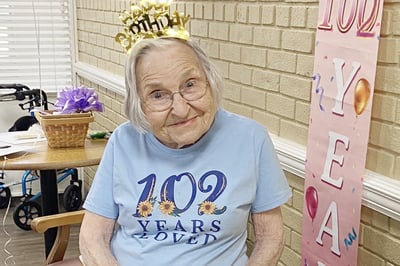 Something else to consider: future rate increases. Every memory care community needs to raise fees periodically to cover their own rising expenses, newly-added services or amenities, etc. However, some facilities tend to raise rates more, or more frequently, than others. Be sure to ask about this.
Something else to consider: future rate increases. Every memory care community needs to raise fees periodically to cover their own rising expenses, newly-added services or amenities, etc. However, some facilities tend to raise rates more, or more frequently, than others. Be sure to ask about this.
As you compare options, it is vital to keep in mind what you’re getting for the amount you pay. Unless your Mom or Dad owns their home outright, they are still making a mortgage payment or paying rent. The monthly cost of memory care may seem daunting if you consider it only compared to this monthly expense. But the amount you pay for memory care covers a multitude of other costs beyond housing -- meals, around-the-clock nursing supervision and medical attention, assistance with activities of daily living, special dementia-related programming, and personalized attention from caring, specially trained staff.
Whatever your loved one’s current living situation, they have costs beyond housing for utilities, food, maintenance, housekeeping, laundry, and so on. To make it easier for you to compare “apples to apples,” we have created this free, easy-to-use cost of living calculator. You can use it to learn more about costs of memory care living at our Magnolia Manor campuses in Americus, Buena Vista, or Columbus and to compare those costs directly with what your loved one is paying now. (Or what you are paying on their behalf.) You may be surprised.
Don’t assume you cannot afford memory care at Magnolia Manor. We take pride in offering outstanding care from outstanding staff, yet our communities may be more affordable than you think. Using our cost calculator can give you a good idea about likely expenses, but we strongly encourage you to discuss finances with us one-on-one. We can do that via phone, or better yet, in person when you visit our campus for a tour. We’re here to help.
Paying For Memory Care
We understand that the cost of memory care is an issue that concerns virtually every family. If your Mom or Dad has previously purchased long term care insurance, that may cover some of the cost of memory care. But the truth is, most people have to pay using their own personal resources. That typically includes:.
- Social Security or pension income
- Savings
- Withdrawals from annuities, IRAs or other retirement accounts
- A bridge loan (in the event your loved one owns a home they can sell)
- You or other family members, if you are in a financial position to help
We recommend reading our Affording Senior Living guide, which explains all the potential resources available to fund senior living. This will help you get a realistic picture of your loved one’s options so you can help them make the most realistic decisions.
 Many people wrongly assume Medicare will pay. Truth is, maybe, or maybe not. We’ll explain more in a moment. Medicare is health insurance, so your loved one will continue to receive the same medical and pharmaceutical coverage as a memory care resident as they now receive living on their own or with you. If your Mom or Dad has a Medicare Advantage plan, coverage may be somewhat more inclusive. (If not, this is an option worth considering when the next open enrollment period comes around.)
Many people wrongly assume Medicare will pay. Truth is, maybe, or maybe not. We’ll explain more in a moment. Medicare is health insurance, so your loved one will continue to receive the same medical and pharmaceutical coverage as a memory care resident as they now receive living on their own or with you. If your Mom or Dad has a Medicare Advantage plan, coverage may be somewhat more inclusive. (If not, this is an option worth considering when the next open enrollment period comes around.)
Medicare does cover diagnostic testing and mental health services that can be of particular benefit in helping diagnose and treat dementia patients. And, of course, Medicare Part D covers prescription medications. Nonetheless, Medicare does not generally cover housing, meals or other expenses for daily living or related assistance in a memory care setting. Here in Georgia, Medicaid also does not cover the cost of assisted living memory care, but it DOES pay for skilled nursing memory care.
How to Choose a Memory Care Facility
If memory care communities all looked and felt the same and offered the same range of services, amenities and activities, it would be easy to compare them. You wouldn’t have to visit to see for yourself and meet the staff. You could just pick the one closest to you. However, that is not the case as we have noted throughout this guide. Like other types of senior living options, memory care can vary considerably.
So how do you find a community that will be a comfortable fit for your loved one? Do initial research by:
- Searching online. You can search by city, state or ZIP code here.
- Asking your loved one’s primary care provider (or your own) for referrals. Medical professionals who regularly treat patients in memory care facilities know which ones really do put residents’ best interests above all else.
- Asking friends, colleagues, or fellow church members for recommendations, if they have elderly parents suffering from dementia.
- Checking with your local Senior Center for a list of nearby facilities.
Make a List of Questions
As you research potential memory care communities, you’ll think of more and more questions to ask. Write them down, so you won’t forget to follow up on some detail. You will definitely want to ask about:
- Security/resident safety systems
- Staff-to-resident ratio (during the day and at night)
- Dementia-specific staff training and experience
- How resident treatment plans are created and how often they are reviewed
- Types of activities available, how they are scheduled and how staff interact with residents to encourage and support engagement
- Are rooms private or semi-private?
- Are residents grouped by level of memory/cognition loss?
- Exactly what is covered (or not) by the monthly fee
- Visitation policies and times, especially regarding family
- Communication with families for routine resident updates
- Programming or support for families
- Emergency preparations – for resident-specific incidents or community-wide emergencies
- References from families of current residents
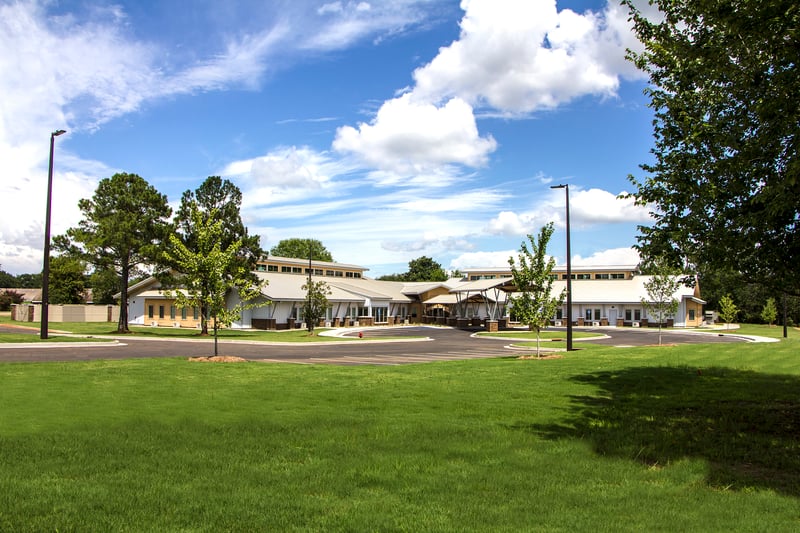 See for Yourself
See for Yourself
It is essential to visit in person before making a decision. It is best to visit more than once, especially if you’re considering multiple communities, to confirm your impressions and make better comparisons. If feasible, (sadly, for most people, it is not) take your Mom or Dad with you. After all, they are the ones who will be living here.
Experts recommend both planned visits and an unplanned one where you can see what the facility is like when they aren’t expecting you. When you make a scheduled visit, be sure to:
- Tour the entire facility, taking in the exterior and interior ambiance as well as physical set-up and security precautions. Ask to see a resident’s room – is it personalized with homey touches such as pictures or mementoes?
- Do residents appear happy and calm? Ask if you can meet a few of them.
- Sit in on a meal. Does it look and smell appealing? Is it tasty – the sort of thing your loved one might like? Does the facility cater to food preferences, allergies, religious requirements, etc.?
- Sit in on an activity.
- Observe the staff. Do they know residents by name and treat them as individuals?
- Meet with intake staff, list of questions in hand. They should welcome those questions and even offer insights or advice about details you might not have considered.
Don’t Wait Any Longer
If your loved one is showing signs of forgetfulness that go beyond normal “senior moments,” or they have already been diagnosed with a form of dementia, do not assume you can care for them on your own indefinitely. Or at all, for that matter. Professional memory care communities can provide for your beloved parent in ways you simply cannot, enriching the future they have left before them. At some point you will need as well as want to take advantage of these benefits, for yourself as well as your Mom or Dad.
Coping with dementia is stressful enough without the added burden of feeling desperate to make a change. And, as we’ve noted, the facilities you find that you like best will likely have a waiting list. Getting on that list as soon as possible improves the odds of a smooth, timely transition when the time comes.
The Positive Side of Memory Care
How to approach moving your loved one to a memory care community is critical. They are likely to resist, when they’re lucid and when they are not. That builds anxiety, which is already a side-effect of dementia, and when the time comes, the move itself could further exacerbate their anxiety, at least at first. You can’t eliminate this problem, but keep it in mind and approach the subject with tenderness as well as love.
We understand how hard it is to let go. This is a time to take advantage of family support groups and understanding friends, who will remind you that you are not abandoning Mom: you are putting her best interests first and doing the very best thing for her. Just as she did time and time again when you were young and couldn’t fend for yourself.
Keeping Memories Alive
The Alzheimer’s Association recommends you make a memory box for your Mom or Dad. These function like a small treasure chest, each with its own cache of memory-triggering contents. Make the process of assembling the box a project you can do together, so you can discuss which mementos to include. Think of each item as a conversation starter.
 Knowing as much as you can about these keepsakes – particularly why they are so important now – will help you draw out your loved one later on as you look through the box together.
Knowing as much as you can about these keepsakes – particularly why they are so important now – will help you draw out your loved one later on as you look through the box together.
You can make a single box, or more than one with a different theme for each – family, sports, whatever is most meaningful:
- Steer your loved one toward small objects, photos, newspaper clippings, etc. that prompt happy memories.
- Think texture, as handling each item can bring additional positive effects.
- The box itself can be something as simple as a shoebox or something that has its own memory value. Be sure it is small enough to hold on a lap, very easy to open, and that nothing associated with the box is sharp or otherwise dangerous.
- The Alzheimer’s Association also recommends you not include anything that is irreplaceable.
Take Advantage of Helping Hands
We hope you are already taking steps to care for yourself. Daily life with a dementia patient can be demanding and difficult, and it is rarely well-understood by others. If you aren’t getting the breaks and support you need, we urge you to seek out local resources that can help, including your local Senior Center, support groups or forums, or your pastor.
We noted earlier that quality memory care communities provide services for families as well as residents. Everyone’s well-being is at stake here, and that is fueled with information, understanding, and support. At Magnolia Manor, we focus on communication, education, and pastoral counseling, all of which are available to families as desired. We invite you to participate one-on-one or to join a support group.
And whether you’re still considering professional memory care, or your Mom or Dad has now moved to one of our Magnolia Manor communities; please know that we are always here to answer questions and provide guidance where we can. We do understand.
Conclusion
Watching a loved one’s memory fade or their ability to think and plan degenerate is heart-wrenching. But it happens to many seniors. Millions. And the numbers are increasing right along with the size of our elder population. You are not alone in your quest to find the best situation for Mom or Dad as they live out their lives.
By doing as much advanced research as you can, you will understand how memory care facilities are designed to give dementia patients the safest, richest, and most fulfilling quality of life possible. With knowledge and prayer, you can face the situation honestly and with confidence that you can make the right, the best, decision for your loved one.
We believe Magnolia Manor is a special place for seniors, regardless of need assistance or mental acuity. We treat residents as individual people because they are members of our family, as well as members of a particular community. We are able to help residents thrive because we thrive on helping them live their best life every day, as best they can. We are guided by our faith, but also the latest advancements in memory care. We invite you to come visit us, to see Magnolia Manor for yourself.
